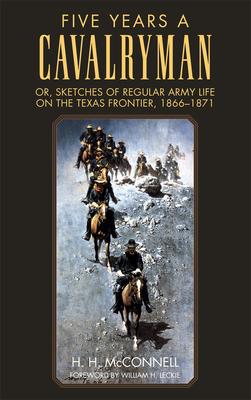First published in 1889, H. H. McConnell's Five Years a Cavalryman remains one of the best accounts of what it was like to be an ordinary cavalryman on the post-Civil War frontier. Posted for five years (1866-1871) with the Sixth U.S. Cavalry at Fort Belknap and Fort Richardson, in West Texas, McConnell gives the unglorified inside story on his fellow enlisted men and the officers, reporting candidly on their heavy drinking, their general disorganization, their boredom, and their thievery.
Regarding the Texas Rangers, he admits that they might be tolerable Indian fighters, but in frontier towns, where they would engage in "shooting scrapes and rows" with its citizens and soldiers, they were more a threat to peace than keepers of the same. His tolerant attitude toward Native Americans is evident in his coverage of the arrest and trial of Satanta, Big Tree, and other Kiowas at Fort Sill, in which he grants that General William Sherman's concurrent visit to the post negatively affected their trial.
In the foreword to this edition, William H. Leckie summarizes McConnell's frontier career and discusses his attitude toward the Tenth Calvary "buffalo soldiers," the Texas Rangers, and officers such as Colonel Ranald MacKenzie.
H. H. McConnell settled in Jacksboro, Texas (where Fort Richardson is located), and became a prominent citizen after his service in the U.S. cavalry. William H. Leckie, who wrote the Foreword, is the author of The Buffalo Soldiers, also published by the University of Oklahoma Press.
